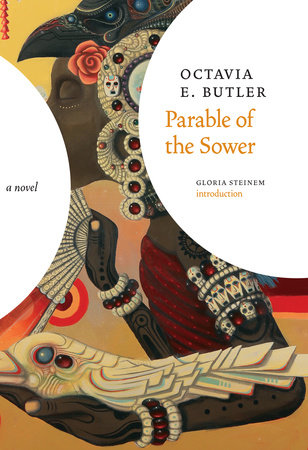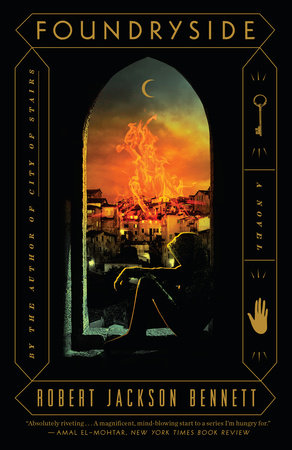Karl Marx may be famous for his thorough, analytic attack on capitalism (see: all three volumes and the 1000-plus pages of Das Kapital), but let’s be real: it’s not the most exciting to read. What if, just as a thought experiment, our works that reimagined current structures of power also had robots?
Speculative fiction immerses the reader in an alternate universe, hooking us in with a stirring narrative and intricate world-building—or the good stories do, anyways. Along the way, it can also challenge us to take a good look at our own reality, and question with an imaginative, open mind: how can we strive to create social structures that are not focused on white, patriarchal, cisgendered, and capitalist systems of inequity?
As poet Lucille Clifton says, “We cannot create what we can’t imagine.” Imagination is an integral element to envisioning concrete change, one that goes hand-in-hand with hope. Although certain magical elements like talking griffins and time travel might be out of reach (at least for the present moment), fantasy and sci-fi novels allow us to imagine worlds that we can aspire towards. Whether through a satire that exposes the ridiculousness of banking or a steampunk rewriting of the Congo’s history, the authors below have found ways to critically examine capitalism—and its alternatives—in speculative fiction.
Everfair by Nisi Shawl
A speculative fantasy set in neo-Victorian times, Shawl’s highly-acclaimed novel imagines “Everfair,” a safe haven in what is now the Democratic Republic of the Congo. In Shawl’s version of the late 19th-century, the Fabian Socialists—a real-life British group—and African-American missionaries band together to purchase a region of the Congo from King Leopold II (whose statue was recently defaced and removed from Antwerp, as a part of the global protest against racism). This region, Everfair, is set aside for formerly enslaved people and refugees, who are fleeing from King Leopold II’s brutal, exploitative colonization of the Congo. The residents of Everfair band together to try and create an anti-colonial utopia. Told from a wide range of characters and backed up with meticulous research, Shawlcreates a kaleidoscopic, engrossing, and inclusive reimagination of what history could have been. “I had been confronted with the idea that steampunk valorized colonization and empire, and I really wanted to spit in its face for doing that,” Shawl states; through her rewritten history of the Congo, Shawl challenges systems of imperialism and capitalism.

Parable of the Sower by Octavia E. Butler
Although written in 1993, Parable of the Sower’s vision of the 2020s rings bleakly true: renowned sci-fi writer Butler grounds her novel in a collapsing society, plagued by climate change, wealth inequality, and attacks on minorities. Her protagonist, Lauren Oya Olamina, grows up in a sheltered bubble near L.A., away from the demise of U.S. capitalism; Lauren also has “hyperempathy,” a condition that renders her both vulnerable and incredibly sensitive to others’ emotions. However, when her home is destroyed, Lauren must pursue a new vision for community. While Butler paints an acutely dark picture of capitalistic greed, she also offers a hope-filled alternative to dystopia, or ways to transform society beyond these destructive models. And if one book of this universe doesn’t sound like enough for you, Lauren’s journey continues in Butler’s sequel, Parable of the Talents.

Making Money by Terry Pratchett
If you stop to think about it, isn’t the concept of a credit card ridiculous? Pratchett’s characters would certainly agree. Pratchett’s Discworld series, as the Guardian noted, “started out as a very funny fantasy spoof [that] quickly became the finest satirical series running.” This installment follows con-man Moist von Lipwig (who first appeared in Pratchett’s spoof on the postal system, Going Postal), as he gets roped into the world of banking. The Discworld capital, Ankh-Morpork, is just being introduced to—you guessed it—paper money. However, citizens remain distrustful of the new system, opting for stamps as currency rather than use the Royal Mint. Cue the Financial Revolution, with Golem Trust miscommunications, a Chief Cashier that may be a vampire, and banking chaos. In his signature satirical style, Pratchett points out the absurdities of the modern financial system we take for granted.

Dark Lord of Derkholm by Diana Wynne Jones
When Derk, a placid magician farmer, and his ragtag family (one sorceress wife, two human children, and five speaking griffins) are somehow put in charge of organizing the “Pilgrim Parties,” everything starts going awry. The Pilgrim Parties are a live-action tour where citizens from Earth can visit to fulfill their own fantasy adventure. However, these tours come at the cost of the agrarian land’s citizens, such as Derk’s family. After all, someone needs to act out the part of the Dark Lord, and transform their comfortable home into foreboding ruins. More seriously, peasants’ homes are routinely pillaged, and the land is suffering at the cost of providing entertainment. The only person benefiting from this exploitative system is an ordinary-looking businessman from Earth, Mr. Chesney, who is armed with economic savviness, malicious desire for profit—and a powerful demon. So, how to stop his reign of business terror? If you thought Jones’s books were just for children, think again. Dark Lord of Derkholm is a rollicking adventure filled with high fantasy and humor, but also examines the damaging effects of the tourism industry and capitalistic intent.

Autonomous by Annalee Newitz
In Newitz’s vision of a technological future, pharmaceutical businesses dominate the world—after much of humanity has been decimated through plagues (yikes); here everything can be owned, patented, and/or programmed. Autonomous follows Jack Chen, a Robin Hood-like “pirate” who develops and distributes free drugs to help the public. When Jack accidentally delivers a lethal drug that makes people into workaholics, driving them to insanity or physical unsafety, she must try to find a reverse cure—and discovers a dangerous secret about the pharmaceutical industry along the way. Meanwhile, the companies send a robot and military agent to track Jack down. Newitz’s framework of work “productivity” as a deadly drug is one we can all afford to keep in mind, as our workplaces and gig economy culture become increasingly focused on production alone. Autonomous is a thoughtful exploration on the dangers of consumerism, as well as a nuanced exploration of AI (robot sexuality is another integral theme).

Foundryside by Robert Jackson Bennett
In Foundryside’s city of Tevanne, magic, or “scriving,” has become industrialized and controlled by the Merchant Houses. The Merchant Houses have used scriving to encode everyday objects; as a result, Tevanne runs like a brutal, well-oiled machine. All this may change when Sancia, a young thief with an ability to sense scriving, is sent to steal an artifact of immense power. This artifact, responsible for generating the codes for the current system, is equally capable of revolutionizing and rewriting the world of Tevanne. (Not to bring in too much Marx here, but Bennett’s “artifact” really reminds me of the famous quote in The Communist Manifesto, where Marx and Engels proclaim that the tools for overthrowing the bourgeoisie will grow from the very system of capitalism itself.) Using magic as a framework, Foundryside—the first book in Bennett’s series—doesn’t shy away from examining the ethics of capitalism and the consequences of corporatization.

The Dispossessed by Ursula Le Guin
If we are talking about speculative fiction and potential utopias, Ursula Le Guin cannot be left off of this list. In The Dispossessed’s universe, the planets of Anarres and Urras have been long divided by political rifts. Anarres is based in anarcho-syndicalism, an ideological system that prioritizes the worker and seeks to abolish the wage system. Urras, on the other hand, is split between two warring factions: a capitalist, patriarchal state and a closed-off, authoritarian government. Shevek, a physicist from Anarres, seeks to peacefully unite the Anarres and Urras, and end the centuries-old tradition of hate and mistrust. Reflecting on her work in 2017, Le Guin wrote of The Dispossessed, “I started by reading a whole mess of utopias and learning something about pacifism and Gandhi and nonviolent resistance. This led me to the nonviolent anarchist writers [with whom] I felt a great, immediate affinity … So, when I realised that nobody had yet written an anarchist utopia, I finally began to see what my book might be.” Although other anarchist utopias have been published after The Dispossessed’s publication 1974, Le Guin’s novel remains a classic sci-fi text.

The Fifth Season by N. K. Jemisin
As we’ve seen above, “anti-capitalism” is usually directly associated with, well, political and economic structures. However, as Marxist postcolonial scholars have continuously noted, “capitalism” doesn’t exist in a vacuum from the other societal systems of oppression; racism is an inherent building block of capitalism. Jemisin’s much-acclaimed novel is, at its heart, an exploration of oppression. Set in “Stillness,” a bleak supercontinent that is regularly ravaged by climate catastrophe and caste systems dominate society, The Fifth Season focuses on three female “orogene” narrators. The orogenes are a caste that has the power to control the earth’s energies; the rest of the population depend on their powers to help subdue climate crises, while simultaneously exploiting them for their own benefit and treating them inhumanely—orogenes are subjected regularly to systematic murders. As the New York Times notes, “Systems of power stalk [Jemisin’s] protagonists, often embodied as gods and primeval forces … When escape comes in her novels, it is not a merely personal victory … Her heroes [are] smashing through oppressive systems and leaving them behind like shed skins.” Even within this dystopian landscape, Jemisin allows room for change, showing various ways to revolutionize and dismantle the system—whether that is an underground community or a utopian deserted island society.
The post 8 Anti-Capitalist Sci-Fi and Fantasy Novels appeared first on Electric Literature.














